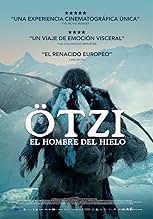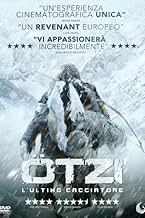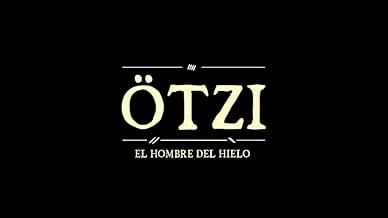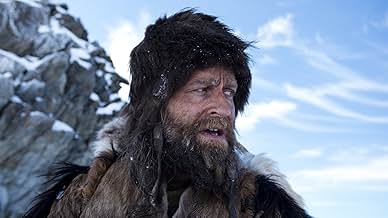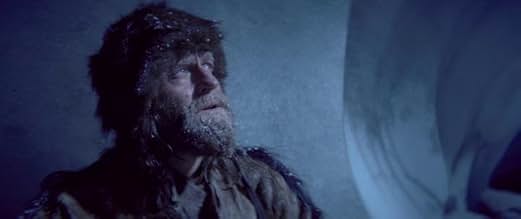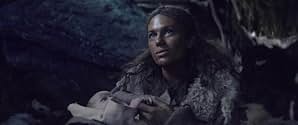IMDb रेटिंग
6.4/10
3.4 हज़ार
आपकी रेटिंग
अपनी भाषा में प्लॉट जोड़ेंThe Ötztal Alps, more than 5300 years ago. A Neolithic clan has settled near a creek. It is their leader Kelab's responsibility to be the keeper of the group's holy shrine Tineka. While Kela... सभी पढ़ेंThe Ötztal Alps, more than 5300 years ago. A Neolithic clan has settled near a creek. It is their leader Kelab's responsibility to be the keeper of the group's holy shrine Tineka. While Kelab is hunting, the settlement is attacked.The Ötztal Alps, more than 5300 years ago. A Neolithic clan has settled near a creek. It is their leader Kelab's responsibility to be the keeper of the group's holy shrine Tineka. While Kelab is hunting, the settlement is attacked.
- पुरस्कार
- 5 कुल नामांकन
फ़ीचर्ड समीक्षाएं
A reasonable film, which certainly beat a previous film of a similar subject that I watched recently. The scenery in this was spectacular, and for that alone, it is worth a watch. The costumes were believable as was the sets, they were so good I could almost smell them (stinky!)
Slightly slow start, but that seemed to take the watcher into the age, there was little in the way of dialogue, unless you understand an ancient language. Soon though the gory bit began, and gory indeed it was.
Shortly later the film, in my mind became a little tedious, along with a bit of guess work due to the lack of dialogue. But picked up again in time for an ending to fit in with the real life find of an ancient man in the mountains. Most likely none of this was his real story, but it all fitted, and gave an insight into living in those days, which would have been a pretty grim if short life.
Shortly later the film, in my mind became a little tedious, along with a bit of guess work due to the lack of dialogue. But picked up again in time for an ending to fit in with the real life find of an ancient man in the mountains. Most likely none of this was his real story, but it all fitted, and gave an insight into living in those days, which would have been a pretty grim if short life.
When I found this movie I was very curious what kind of story they put forward. Knowing that there is not spoked in a modern language or translated made it even more appealing. However, it turned out to be disappointing.
For the good part, I have to say that I enjoyed how they tried to show how people used to live five millenniums ago. I don't know if it was really like that or not, but I appreciated the attempt. You don't see often that kind of undertaking.
However, the story that unfolded was nothing but modern day Hollywood blockbusters set in another era. Put Tom Cruise in the main role and you have everything. Was that all they could come up with? The hero leaves home and in his absence his entire family gets killed so he sets on a journey of revenge. Liam Neeson could not be more convincing. Of course, we all know what happened to Otzi, although you have to watch the movie to see what led to that.
It's an overall 6 stars from me.
For the good part, I have to say that I enjoyed how they tried to show how people used to live five millenniums ago. I don't know if it was really like that or not, but I appreciated the attempt. You don't see often that kind of undertaking.
However, the story that unfolded was nothing but modern day Hollywood blockbusters set in another era. Put Tom Cruise in the main role and you have everything. Was that all they could come up with? The hero leaves home and in his absence his entire family gets killed so he sets on a journey of revenge. Liam Neeson could not be more convincing. Of course, we all know what happened to Otzi, although you have to watch the movie to see what led to that.
It's an overall 6 stars from me.
Not a bad movie, "Der Mann aus dem Eis" gets weighed down by its "plot" which concentrates on Ötzi's violent death and the days before, creating a murder and revenge story with lots of violence but no levity at all.
The movie gets plus points for trying to get its history right; I liked how it highlights the fact that even then, in the late stone- / early bronze age, humankind was already far removed from the nature it still depended upon. A good idea in this respect were some rituals, plus of course the story's MacGuffin, an obsidian shard used for rituals which is kept in a pretty wooden box.
On the minus side, the amount of violence was maybe historically accurate but if you already go the length of portraying a stone age society halfway correctly (including made-up speech), you might as well include the nicer aspects of human life. A few tender looks and embraces during the first five minutes is all we get.
From the technical POV, the production is OK, out of their limited budget they got everything which could be expected and then some - the sets were fine, the costumes great, casting and acting good (nice lengthy cameo by Franco Nero) and of course the spectacular outdoor locations are an asset. Yet in many instances the camera-work stays rather pedestrian, so while the story shares some genes with "The Revenant", the photography is of lower quality (no big deal, Lubezki is a genius and no mistake). There's only two scenes where the pictures really take flight - one chase along a ridge filmed with a drone or cable-camera against spectacular backdrops, really vertigo-inducing that one - and one lengthy sequence where the hero is trapped in a crevasse below the glacier. Both scenes only emphasize that there was a better movie somewhere but it got buried under a too-simple and violent plot.
Recommended all the same, especially for the realistic portrayal of those early societies.
The movie gets plus points for trying to get its history right; I liked how it highlights the fact that even then, in the late stone- / early bronze age, humankind was already far removed from the nature it still depended upon. A good idea in this respect were some rituals, plus of course the story's MacGuffin, an obsidian shard used for rituals which is kept in a pretty wooden box.
On the minus side, the amount of violence was maybe historically accurate but if you already go the length of portraying a stone age society halfway correctly (including made-up speech), you might as well include the nicer aspects of human life. A few tender looks and embraces during the first five minutes is all we get.
From the technical POV, the production is OK, out of their limited budget they got everything which could be expected and then some - the sets were fine, the costumes great, casting and acting good (nice lengthy cameo by Franco Nero) and of course the spectacular outdoor locations are an asset. Yet in many instances the camera-work stays rather pedestrian, so while the story shares some genes with "The Revenant", the photography is of lower quality (no big deal, Lubezki is a genius and no mistake). There's only two scenes where the pictures really take flight - one chase along a ridge filmed with a drone or cable-camera against spectacular backdrops, really vertigo-inducing that one - and one lengthy sequence where the hero is trapped in a crevasse below the glacier. Both scenes only emphasize that there was a better movie somewhere but it got buried under a too-simple and violent plot.
Recommended all the same, especially for the realistic portrayal of those early societies.
A Neolithic revenge story seeks to explain the mysterious man found frozen in the Alps. Written and directed by Felix Randau, and originally release in Germany in 2017 as Der Mann aus dem Eis, Iceman purports to tell the story of a Copper Age man preserved in the frozen Alps for 5,000 years. Beautiful landscapes and harrowing authenticity help balance what might otherwise be a one-dimensional revenge plot.
Kelab (Jürgen Vogel), Kisis (Susanne Wuest), and their clan are living in the Ötztal Alps around 3000 BC, where Kelab protects a fetish called Tineka. The clan is blessed with the birth of a child, but grieved by the loss of its mother. When Kelab is off hunting in the woods, a trio of raiders attack his village, slaughter its inhabitants, and steal their idol. Filled with a desire for revenge, Kelab rescues the newborn and pursues the raiders.
Along the way, Kelab interacts with other Neolithic people, including an old man, Ditob (Franco Nero), and his daughter Mitar (Violetta Schurawlow), in their sparsely populated valley. Can Kelab survive the harsh elements to exact revenge and take back his sacred Tineka?
Iceman was inspired by Ötzi the Iceman. In 1991, Alpine hikers discovered a mummified body partially frozen in ice. Shockingly, scientists dated its age to somewhere between 3400 and 3100 BC. The adult male was so well preserved that scientists were able to determine precisely what he ate in the days before he died. Most intriguingly, they discovered his cause of death was an arrow impaled in his back, compounded by other injuries.
It's impossible to say for certain who this man was and the larger circumstances leading to his death, but evidence gathered from his corpse informs Iceman in a credible and convincing way. Scientists identified blood from at least four other people on his weapons and clothing, so we know he was involved in a violent struggle. The film is so authentic its characters even speak an early version of Rhaetic, a language related to Etruscan and spoken by pre-Indo Europeans living in that region.
Like Alpha (2018), Iceman has great cinematography, was shot in beautiful and sweeping landscapes, and tries to authentically re-create prehistoric culture. Unlike Alpha, however, Iceman has a realistic story. When one man falls from a sheer cliff, he breaks his back instead of being conveniently saved by ridiculously improbable circumstances.
But for all its good qualities, Iceman left something to be desired. The 1981 French film Quest for Fire, in which the the dialog is also spoken in a prehistoric language, benefited from rich interactions between the characters. In contrast, Iceman was oddly solipsistic. Interactions between characters were kept at a bare minimum. I expected much more, particularly when it came to Kelab and his encounters with other humans. I'm not an anthropologist, but I'm pretty sure we were able to communicate and express emotions other than anger back then.
Iceman was generally praised by critics, but left audiences shrugging their shoulders. It currently has an audience favorability rating of 54% on RottenTomatoes. I probably would've had the same reaction if I didn't love historically authentic films. For me, seeing this primitive man's world come to life more than made up for Iceman's deficiencies.
Kelab (Jürgen Vogel), Kisis (Susanne Wuest), and their clan are living in the Ötztal Alps around 3000 BC, where Kelab protects a fetish called Tineka. The clan is blessed with the birth of a child, but grieved by the loss of its mother. When Kelab is off hunting in the woods, a trio of raiders attack his village, slaughter its inhabitants, and steal their idol. Filled with a desire for revenge, Kelab rescues the newborn and pursues the raiders.
Along the way, Kelab interacts with other Neolithic people, including an old man, Ditob (Franco Nero), and his daughter Mitar (Violetta Schurawlow), in their sparsely populated valley. Can Kelab survive the harsh elements to exact revenge and take back his sacred Tineka?
Iceman was inspired by Ötzi the Iceman. In 1991, Alpine hikers discovered a mummified body partially frozen in ice. Shockingly, scientists dated its age to somewhere between 3400 and 3100 BC. The adult male was so well preserved that scientists were able to determine precisely what he ate in the days before he died. Most intriguingly, they discovered his cause of death was an arrow impaled in his back, compounded by other injuries.
It's impossible to say for certain who this man was and the larger circumstances leading to his death, but evidence gathered from his corpse informs Iceman in a credible and convincing way. Scientists identified blood from at least four other people on his weapons and clothing, so we know he was involved in a violent struggle. The film is so authentic its characters even speak an early version of Rhaetic, a language related to Etruscan and spoken by pre-Indo Europeans living in that region.
Like Alpha (2018), Iceman has great cinematography, was shot in beautiful and sweeping landscapes, and tries to authentically re-create prehistoric culture. Unlike Alpha, however, Iceman has a realistic story. When one man falls from a sheer cliff, he breaks his back instead of being conveniently saved by ridiculously improbable circumstances.
But for all its good qualities, Iceman left something to be desired. The 1981 French film Quest for Fire, in which the the dialog is also spoken in a prehistoric language, benefited from rich interactions between the characters. In contrast, Iceman was oddly solipsistic. Interactions between characters were kept at a bare minimum. I expected much more, particularly when it came to Kelab and his encounters with other humans. I'm not an anthropologist, but I'm pretty sure we were able to communicate and express emotions other than anger back then.
Iceman was generally praised by critics, but left audiences shrugging their shoulders. It currently has an audience favorability rating of 54% on RottenTomatoes. I probably would've had the same reaction if I didn't love historically authentic films. For me, seeing this primitive man's world come to life more than made up for Iceman's deficiencies.
In 1991, a frozen dead man is found in the Alps. He's been there for 5300 years. "This is his story." Kelab returns from hunting to find his settlement burnt down and his family massacred. A three man war party had come to steal a relic.
It's a little slow to start. It's trying to be authentic which includes limited dialogue and everybody looking like the same caveman. The sets and the costumes seem very authentic. Rather quickly, this gets brutally violent and it's a revenge plot. It becomes a harsh western and that's quite compelling. This can be slow at times especially with the quiet. Nevertheless, this is a simple and effective tale of a brutal age.
It's a little slow to start. It's trying to be authentic which includes limited dialogue and everybody looking like the same caveman. The sets and the costumes seem very authentic. Rather quickly, this gets brutally violent and it's a revenge plot. It becomes a harsh western and that's quite compelling. This can be slow at times especially with the quiet. Nevertheless, this is a simple and effective tale of a brutal age.
क्या आपको पता है
- ट्रिवियाBlood from four different people was actually found on the real-life Ötzis' belongings, supporting the idea that he led a sometimes violent life.
- गूफ़In the film the Berkshire pig is discernible. This is a British breed (a rare breed) of pig originating in the early 19th century, thus, it could not have been there in the Alps more than 5000 years ago.
- कनेक्शनEdited into heute-show: Folge 309 (2019)
टॉप पसंद
रेटिंग देने के लिए साइन-इन करें और वैयक्तिकृत सुझावों के लिए वॉचलिस्ट करें
विवरण
- रिलीज़ की तारीख़
- कंट्री ऑफ़ ओरिजिन
- आधिकारिक साइट
- भाषा
- इस रूप में भी जाना जाता है
- Iceman
- फ़िल्माने की जगहें
- Alto Adige/Südtirol, इटली(location)
- उत्पादन कंपनियां
- IMDbPro पर और कंपनी क्रेडिट देखें
बॉक्स ऑफ़िस
- US और कनाडा में सकल
- $2,138
- US और कनाडा में पहले सप्ताह में कुल कमाई
- $1,372
- 17 मार्च 2019
- दुनिया भर में सकल
- $6,719
- चलने की अवधि1 घंटा 36 मिनट
- रंग
- पक्ष अनुपात
- 2.35 : 1
इस पेज में योगदान दें
किसी बदलाव का सुझाव दें या अनुपलब्ध कॉन्टेंट जोड़ें



